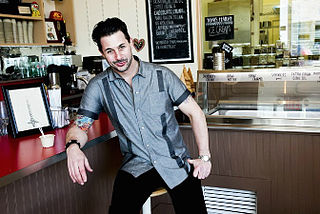A Quote by Mark Kurlansky
Salt is an unusual food product because it is almost universal - all human beings need salt, and most choose to eat more than is necessary.
Related Quotes
Salt is a powerful symbol in Haiti, as elsewhere. Salt of the earth, for example is an American phrase. In Haiti, myth and legend has it that if you are turned into a zombie, if someone gives you a taste of salt, then you can come back to life. And in the life of the fishermen, there are so many little things about salt that I wanted to incorporate. The salt in the air. The crackling of salt in the fire. There's all this damage, this peeling of the fishing boats from the sea salt. But there is also healing from it, sea baths that are supposed to heal all kinds of aches and wounds.
When it comes to salt, what was really staggering to me is that the industry itself is totally hooked on salt. It is this miracle ingredient that solves all of their problems. There is the flavor burst to the salt itself, but it also serves as a preservative, so foods can stay on the shelves for months.
































